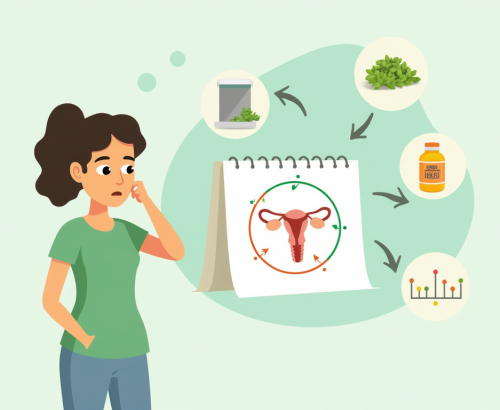
Heavy menstrual flow, or menorrhagia, is when you experience unusually heavy bleeding during your period. This can be uncomfortable and disruptive, but understanding the causes, symptoms, and treatment options can help you manage it effectively. Let’s break it down in simple terms.
What Is Heavy Menstrual Flow?
Heavy menstrual flow means losing more blood than usual during your period. While everyone’s flow is different, heavy bleeding typically means soaking through one or more pads or tampons every hour or needing to change them frequently. You might also notice large blood clots or bleeding that lasts longer than a week.
Common Causes of Heavy Menstrual Flow
Hormonal Imbalances
Hormones control your menstrual cycle. If they’re out of balance, it can cause heavier bleeding. Conditions like polycystic ovary syndrome (PCOS) or thyroid disorders can disrupt your hormone levels.
A doctor can test your hormone levels to see if an imbalance is the cause. Treatments may include hormonal birth control or medication to help regulate your cycle.
Uterine Fibroids
Uterine fibroids are non-cancerous growths in the uterus that can cause heavy bleeding. They can vary in size and may lead to a heavier or longer period.
Treatments for fibroids include medication to reduce bleeding or surgery to remove them. Your doctor can recommend the best option based on your situation.
Endometriosis
Endometriosis is a condition where tissue similar to the lining of the uterus grows outside the uterus. This can cause heavy bleeding and severe pain during your period.
Treatment may include pain relief medications, hormonal therapy, or surgery to remove the endometrial tissue. Consult with a healthcare provider for a treatment plan tailored to your needs.
Pelvic Inflammatory Disease (PID)
PID is an infection of the reproductive organs that can cause heavy periods, along with pelvic pain and unusual discharge.
Antibiotics are usually prescribed to treat PID. If you suspect PID, see a doctor for a proper diagnosis and treatment.
Medications
Certain medications, such as blood thinners or hormone replacement therapy, can lead to heavier periods as a side effect.
If you think your medication is causing heavy bleeding, talk to your doctor. They may adjust your dosage or suggest alternative treatments.
Pregnancy Complications
Heavy bleeding early in pregnancy might be a sign of a miscarriage or an ectopic pregnancy (where the embryo grows outside the uterus).
If you’re pregnant and experiencing heavy bleeding, contact your healthcare provider immediately for evaluation and care.
Thyroid Disorders
Thyroid problems, such as hypothyroidism or hyperthyroidism, can affect your menstrual cycle and cause heavy bleeding.
A thyroid test can check if thyroid issues are causing your heavy periods. Treatment typically involves medication to regulate thyroid function.
Symptoms of Heavy Menstrual Flow
Soaking Through Pads or Tampons Frequently: Changing your pad or tampon every hour or even more often.
Large Blood Clots: Passing large clots of blood during your period.
Prolonged Bleeding: Your period lasting longer than a week.
Severe Cramping: Intense cramps that are worse than usual.
Fatigue: Feeling unusually tired or weak due to blood loss.
Treatment Options for Heavy Menstrual Flow
Lifestyle Changes
Sometimes, simple lifestyle adjustments can help manage heavy periods. Eating a balanced diet, exercising regularly, and reducing stress can support overall menstrual health.
Include iron-rich foods in your diet to compensate for blood loss. Regular physical activity and stress management techniques can also improve your menstrual health.
Over-the-Counter Medications
Pain relievers like ibuprofen (Advil, Motrin) can reduce heavy bleeding and relieve menstrual cramps.
Take the medication as directed on the label. If you have any health conditions or are taking other medications, consult with a healthcare provider before using these drugs.
Hormonal Birth Control
Hormonal contraceptives, such as birth control pills, patches, or hormonal IUDs, can help regulate your menstrual cycle and reduce heavy bleeding.
Discuss with your doctor which hormonal option is best for you. They can guide you through choosing the right method and managing any side effects.
Medication to Reduce Bleeding
Medications like tranexamic acid (Lysteda) or desmopressin can help reduce menstrual bleeding by affecting blood clotting.
Your doctor will prescribe these medications based on your needs and monitor their effectiveness.
Iron Supplements
If heavy bleeding has led to anemia (low iron levels), iron supplements can help replenish your iron and improve your energy levels.
Take iron supplements as directed by your healthcare provider. Eating iron-rich foods like spinach, red meat, and beans can also help.
When to See a Doctor
It’s important to see a doctor if you experience heavy menstrual flow that:
Affects your daily life or causes severe discomfort.
Is accompanied by symptoms like dizziness or shortness of breath.
Persists despite trying home remedies or over-the-counter treatments.










